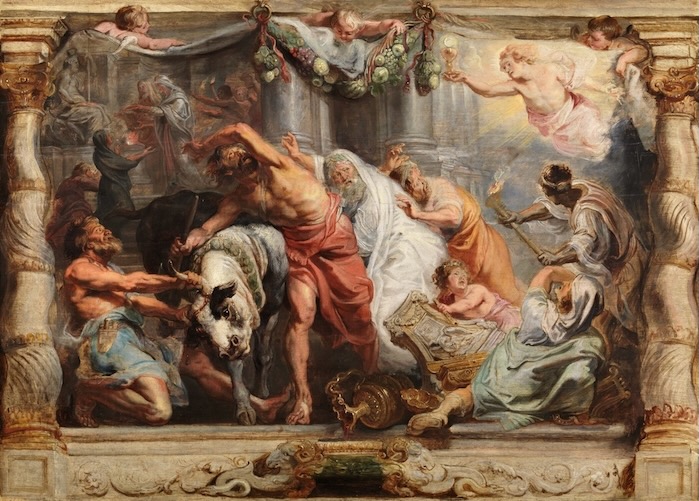Preparations have been underway for some time for the National Eucharistic Congress, which will take place next summer in Indianapolis. The Eucharistic Congress will mark the culmination of a three-year Eucharistic Revival here in the United States, undertaken to rekindle a deeper relationship with our Lord in the Holy Eucharist.
For the faithful, the reasons to hope for a revival in devotion to the source and summit of Christian life ought to be clear. Recent polls indicate that belief in the Real Presence is depressingly low among Catholics (even one-third of those who attend Mass think the Eucharist a symbol). Mass attendance has been flagging for a long time, a trend accelerated by COVID policies.
If devotion to the font of our Catholic faith is waning, it’s hardly surprising that the rest of sacramental life follows along the same path. Catholic marriage rates are falling and, with them, predictably, births and baptisms. First Communions and Confirmations are down. Ordinations are down, too, though not as dramatically.
Sheer numbers are not the only or even the best way to judge the health of the Church. But to these discouraging numbers, we could add the deep political, social, and cultural divisions among American Catholics; the festering damage of the abuse crisis; and deep disagreements about matters of faith (including, as already said, about liturgy and the nature of the Eucharist itself). Amidst all this, the urgent desire that something be done – something big and something soon – becomes easy to understand.
But if a renewal of the faith is to be desired, it’s worth asking whether a national Eucharistic Revival (and next year’s Eucharistic Pilgrimage and Eucharistic Congress) is the sort of thing that might actually bring about genuine renewal.
Calling this effort a “Eucharistic Revival” does not make it so, any more than the “new evangelization” or “synodality” become a reality by the constant repetition of those words.
Could the Eucharistic Revival prove to be a colossal boondoggle – a grand spectacle designed to give the appearance of “doing something” while failing to address the underlying maladies afflicting the Church in the United States?
A few critics of the Eucharistic revival seem convinced it will be precisely that: a flashy (and expensive) distraction from the real work and mission of the Church. Of course, the same could be asked (and has been asked for decades) about World Youth Days.

In order to succeed, large ecclesial events like the Eucharistic Congress or World Youth Day, must not ultimately be about the events themselves. At their best, such events provide the occasion for participants to step out of the ordinary rhythms of everyday life to join in an edifying spectacle. And I don’t say spectacle in a disparaging way.
I remember how moving it was to kneel in the hot and dusty field of Tor Vergata, with 2 million other people, to pray in vigil before the Mass with Pope John Paul II at World Youth Day in Rome. That was a spectacle in the best sense. It was not the sort of thing one sees every day, or even more than once.
For me, as for a great many others, it was a moment of edification and grace. You could see the same in the faces of the youth in photos from World Youth Day in Portugal last week. Such moments can have profound and lasting effects. A whole flock of initiatives and ministries, still flourishing today, can trace their roots, more or less directly, back to World Youth Day in Denver in 1993.
The real challenge, of course, is what comes after.
The measure by which large ecclesial events like the Eucharistic Congress or World Youth Day ought to be judged is a tricky one. Not everything is quantifiable, especially in matters of faith, as though one could measure the efficiency of Providence. He leads all hearts according to His own designs and in his own time. If our work, however well-intentioned, is not His, none of our efforts will prevail. If we listen to His call, and persevere, even our own frailty and sin cannot deter Him.
Lasting, transformative renewal rarely begins with a grand plan, not with one of our own making, anyway. And it almost never comes from the top down. (Which is not to say that ecclesial leaders cannot do much to encourage, or frustrate, such renewal.) In every age of the Church, renewal begins the same way: men and women respond to God’s call in a radical way. God acts; we respond.
If we respond generously, we can be confident that the Lord will be at work. Even then, we should expect renewal, not according to our own plans or ambitions, but by the strange paths of Providence. The one thing we should not expect is to remain unchanged.
That is the great risk, too, if we’re being honest. If you are like me, the most terrifying thing of all is to be forever changed. But that is always the risk of encountering Christ. As Paul encouraged the Ephesians, “put away the old self of your former way of life, corrupted through deceitful desires, and be renewed in the spirit of your minds, and put on the new self, created in God’s way in righteousness and holiness of truth.”
And that, it turns out, is how you start a revival. It begins with the courageous response of an open heart, transformed by an encounter with the Lord.
The Eucharistic Congress–the event itself–is not the endpoint of the Eucharistic Revival. Rather, it is the summons. Our shepherds have invited us to renew and deepen our devotion to Christ in the Eucharist. They know that it will not be an elaborate convention, however worthwhile or spectacular, that will renew the Church, but a Person. Jesus Christ. He is calling us each by name. Will we respond with generous hearts? Will we have the courage to answer the summons?
__________















